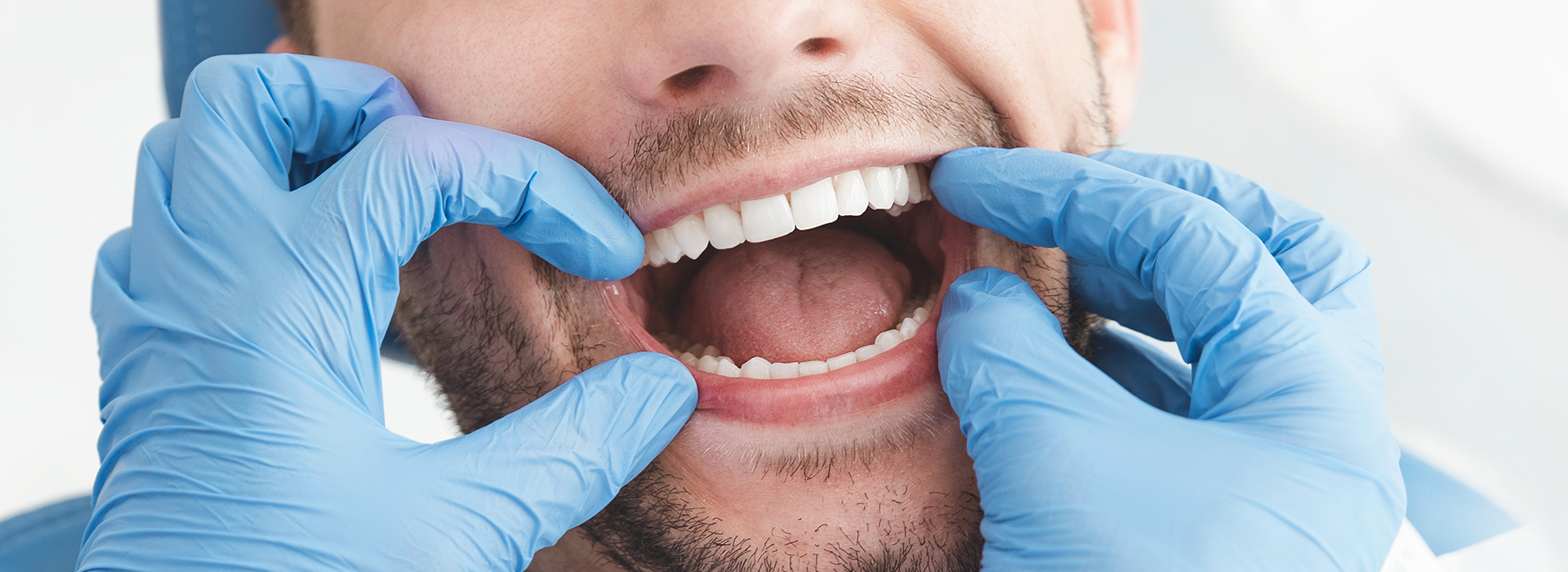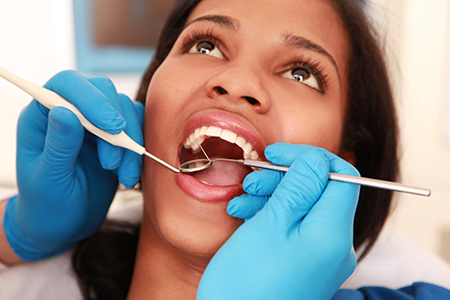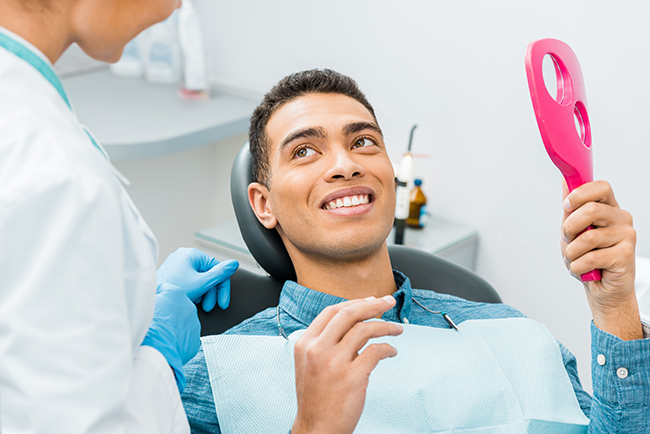
At Richwood Family Dental, we take a practical, prevention-first approach to oral care. Regular oral exams allow our team to identify small problems before they become complex, and they give us the chance to develop care plans tailored to each patient’s needs. During an exam we combine careful visual inspection with targeted diagnostic tools and expert assessment of soft tissues, teeth, bite relationships, and jaw function. Patient education is also a core part of the visit so you leave with clear, actionable steps for daily care.
Your first comprehensive visit establishes a baseline for future care and helps us learn about your medical history, medications, and any current concerns. We begin with a respectful conversation about prior dental experiences, comfort preferences, and your goals for oral health. That background guides the exam and ensures we address both immediate needs and long-term prevention.
The clinical portion includes a systematic review of the mouth: teeth, gums, tongue, cheeks, palate, and the surrounding tissues of the head and neck. Our team screens for early signs of decay, gum inflammation, abnormal growths, and wear from grinding. We also assess how your teeth meet together and evaluate temporomandibular joint (TMJ) function when needed.
When appropriate, we will recommend diagnostic imaging to reveal conditions not visible during a visual inspection. After the exam and any x‑rays, we review findings with you in plain language, outlining recommended next steps. You’ll receive guidance on hygiene techniques and preventive measures specific to your situation so you can take an active role in protecting your smile.

Oral health doesn’t exist in isolation. The tissues in and around your mouth can reflect broader health trends, and chronic dental problems may influence systemic conditions. During an exam we look for signs that could indicate inflammation, infection, or other issues that warrant coordination with medical providers. Spotting these indicators early helps protect not only your teeth and gums but your overall health too.
Researchers continue to explore links between oral disease and conditions such as heart disease, diabetes, respiratory infections, and certain inflammatory disorders. While the nature of these relationships is complex, controlling oral inflammation and infection is a sensible step toward lowering related health risks. We take these connections seriously and document findings to support comprehensive care.
Conversely, systemic illnesses and many common medications can produce symptoms inside the mouth—dry mouth, ulcers, changes in gum tissue, or healing delays. Our exam is attentive to these manifestations so we can advise you on appropriate next steps, whether that means tailored oral hygiene strategies or referral to a physician for further evaluation.

Routine checkups and professional cleanings are the most effective way to keep small issues from becoming complicated treatments. Even patients who are diligent about brushing and flossing benefit from the hygienist’s ability to remove hardened deposits and clean areas that are hard to reach at home. These visits also give us the chance to monitor changes over time and intervene early when necessary.
During a preventive visit we evaluate your risk for common problems like cavities and gum disease, applying evidence-based recommendations such as sealants or fluoride where appropriate. We also provide individualized coaching on brushing technique, interdental cleaning, and lifestyle factors—like diet and tobacco use—that affect oral health. Prevention is practical and patient-focused.
For families, preventive care builds lifelong habits. Children and adolescents who receive regular exams are more likely to avoid preventable dental disease, and adults who stay engaged in routine care often enjoy fewer restorative visits. Our goal is to make preventive maintenance straightforward and achievable so patients of every age can sustain healthy, functional smiles.
Should additional treatment be indicated, we’ll explain options clearly and prioritize minimally invasive approaches whenever possible. The emphasis is always on preserving natural tooth structure and restoring comfort and function with predictable results.
Many conditions that affect teeth and jawbone are hidden from plain sight. Diagnostic imaging complements the visual exam by revealing the roots of teeth, the health of the supporting bone, and the presence of developing or impacted teeth. Imaging plays a key role in accurate diagnosis and treatment planning for routine care as well as more advanced procedures.
Modern dental practices rely on digital radiography, which captures high-quality images quickly while minimizing radiation exposure. Images are available immediately for review, can be stored in your electronic record, and may be shared with specialists if a consult is needed. The efficiency and clarity of digital images make them a valuable part of delivering precise care.
We only recommend the images necessary for the clinical question at hand, balancing diagnostic benefit with patient safety. When used appropriately, radiographs let us detect decay between teeth, evaluate bone levels around teeth, see suspected infections, and monitor growth and development in younger patients. Clear imaging leads to better decisions and more predictable outcomes.

There are several common types of dental images, each suited to specific diagnostic needs. Periapical films focus on an individual tooth from crown to root and are useful for evaluating root health and nearby bone. Bitewing images capture the crowns of back teeth to detect decay between teeth. Selecting the correct view ensures we have the information needed to make an accurate assessment.
For broader evaluations, a full mouth series combines periapical and bitewing views to document the condition of all teeth. Panoramic films (panorex) provide a single, wide-angle view of the jaws and tooth positions—helpful for assessing impacted teeth, jawbone integrity, and overall development. In cases that require three-dimensional detail, cone-beam computed tomography (CBCT) produces 3D images used for surgical planning and implant placement.
Each imaging modality has a clear purpose. We will discuss why a particular image is recommended for your situation, what it can reveal, and how it informs your treatment plan. Transparency about diagnostic steps is part of our commitment to thoughtful, patient-centered care at Richwood Family Dental.
When radiographs are taken, images are stored securely in your chart for ongoing comparison. Tracking change over time helps us identify trends early, measure the effectiveness of treatment, and adjust care as needed to maintain oral health and function.
Regular oral exams are a dependable way to protect your oral health and spot concerns early, when they are easiest to treat. If you'd like to learn more about what happens during an exam or how often you should be seen, please contact us for additional information or to schedule an appointment.
Yes. We always welcome new patients and their families for care. Feel free to give us a call or reach out to us online to schedule a first visit or for any additional information on our office. We look forward to hearing from you!
Routine dental checkups and professional cleanings help ensure your smile remains in tip-top condition and that any developing problems receive the prompt care they require. While it's a good idea to schedule a checkup and cleaning twice a year, longer or shorter intervals between routine visits depend on your specific needs.
We understand that life gets complicated and busy, and for various reasons, you haven't been able to get to the dentist for care. Don't worry; it's always a good time to get back in touch with the health of your smile.
At Richwood Family Dental, we offer skilled and compassionate care to address a wide range of dental needs. Whether you need a simple checkup and cleaning, restorations, periodontal treatment, root canal therapy, or the replacement of missing teeth to get your smile back into shape, we provide precise, gentle, stress-free treatment to give you a smile that is as beautiful as it is healthy.
Give us a call today; we're happy to address all your questions and concerns about getting your smile back in tip-top condition.
For pregnant women, practicing good oral care and seeing the dentist to maintain a healthy smile is considered an important component of prenatal care. Researchers have found that pregnancy not only increases the risk of oral health problems, but these problems may also lead to pregnancy complications. At the office of Richwood Family Dental, we provide the skilled and compassionate care required to help expectant mothers keep their teeth and gums in tip-top condition. While certain procedures are not recommended during pregnancy, we provide the necessary care and take all the necessary precautions required.
Thanks to advances in modern dentistry, teeth that have been affected by a range of imperfections or that have sustained damage from trauma or dental decay can be restored to produce a naturally beautiful looking and functional smile.
As skilled and experienced providers of care, our office can effectively improve and enhance the appearance of teeth that are stained, discolored, misshapen, chipped, fractured, gapped, crowded, or broken down due to dental decay. At the office of Richwood Family Dental, we offer a comprehensive selection of the leading-edge cosmetic solutions from teeth whitening procedures, dental bonding, tooth-colored fillings, and veneers, to prosthetic solutions and dental implants to rebuild complete and beautiful smiles.
Contact our office to learn more about the many ways we can help you create the smile you've always wanted.
If you're visiting Richwood Family Dental for the first time, it is helpful that you contact your former dental office and have your records sent over to us. Make note of any problems you may have so that you can discuss them with your dentist.
To provide efficient service, we ask you to please bring your insurance card, an ID, plus any referral slips or diagnostic records given to you by another office. If you are taking medications, please note or make a list of what they are as you will need to provide that information.
Yes! We assure you that both you and your family will be in good hands at the office of Richwood Family Dental.
We do our best to make sure every patient who steps into our office for care is put at ease. We provide precise and gentle care and our skilled, compassionate team strives to make every visit stress-free. You can rest assured that your smile is in the best of hands and that we are doing all we can to ensure your comfort throughout every procedure. While we always take the time to explain every step in care, feel free to ask us any questions about local anesthesia and methods of dental sedation.
At the office of Richwood Family Dental, we strive to provide the highest quality of care to address all your dental needs. Once we've had the opportunity to examine your smile, we can give you a clear picture of any dental issues that are present, along with a quote for what the cost of treatment will be. The cost of care all depends upon the extent and complexity of issues affecting the health or appearance of your smile and the types of procedures that are required. Our goal is to make dental care more affordable so that you can begin treatment without any additional stress or delay.
Keep in mind that with routine dental checkups and periodic care, we can help prevent dental disease while treating emerging problems early in their onset to avoid larger issues and more expensive care down the road.
Routine dental checkups and preventive care procedures may be covered under your dental insurance plan requiring little to no out-of-pocket expense. We invite you to check our financial information page or give us a call to find out if our office participates with your plan, and if you have any other questions about dental insurance, dental savings plans, forms of payment, or financing options. We welcome your inquiries and do our best to help you begin care without additional stress or delay.
If you've lost a tooth due to injury, decay, gum disease, or any other reason, we recommend dental implants to replace missing teeth. Dental implants come the closest to replicating the look, feel, and function of your natural teeth.
Absolutely! Both flossing and brushing regularly are equally important to maintain your oral health. While brushing cleans the surface of your teeth, flossing cleans in between them. Flossing is important to prevent plaque buildup, which can cause gums to recede and lead to periodontal disease.
Even if you have dentures, it is still necessary to see a dentist! Dental checkups help ensure that your dentures are comfortable, fitting properly, and that there are no other problems. Beyond assessing your dentures, our dentist will also perform a thorough examination of the jawbone, and surrounding soft tissues both inside the mouth, the face, and neck, to confirm that you remain in good oral health.
Emergency dental care is a service we hope you'll never need- but if you do, the office of Richwood Family Dental is here for you!
Whether you're suffering from a chipped tooth, toothache, or any problem affecting your oral health, you can be sure to get the prompt attention and compassionate care you require at our office. Patient care and comfort are our top priorities, and we offer a comprehensive range of the most advanced services to address a broad spectrum of dental needs.
While the pain of a toothache is one of the more common reasons that patients come to our office for emergency dental care, we also promptly treat emergencies that are not necessarily painful like crowns that have been dislodged and broken dentures that leave embarrassing gaps in one's smile.
You can rest assured that your oral health is in the best of hands at our office. We'll quickly determine exactly what's wrong, explain your treatment options, and then provide the precise and gentle care you require to alleviate your discomfort and get you back on the path to oral health and wellness.
Your health and comfort are our top priorities. If your dental emergency is painful, if it affects the appearance of your smile, or if you suspect that an infection is present, our office will make every effort to see you as soon as possible for care.
At the office of Richwood Family Dental, we welcome patients of all ages for care and offer a comprehensive range of services designed to help every member of your family maintain a beautiful and healthy smile. Whether you or a loved one needs a routine checkup and cleaning, fillings, same-day crowns, a cosmetic smile makeover, the replacement of missing teeth or require the services of a skilled and compassionate emergency dentist, you can rely on our office for the highest quality care.
For more information on our office and the many services we provide, or to schedule an appointment for care, give us a call today.
An oral exam is a clinical evaluation of the teeth, gums, jaws, and surrounding tissues that helps identify current problems and prevent future disease. The exam allows the dental team to detect decay, gum disease, bite issues, signs of trauma, and early indications of other conditions. Early detection during an oral exam often simplifies treatment and preserves more of the natural tooth structure.
Oral exams also include screening for oral cancer and a review of medical history to identify risks that influence dental care. By combining visual inspection with diagnostic tools such as x-rays, the exam provides a comprehensive snapshot of oral health. Regular exams form the foundation of preventive dentistry and support long-term wellness for patients of all ages.
For most patients, a routine oral exam is recommended every six months to coincide with professional cleanings and to monitor changes in oral health over time. Patients with a history of periodontal disease, rapid decay, certain medical conditions, or a history of tobacco use may need more frequent visits, often every three to four months. The dental team will recommend an individualized schedule based on your risk factors and clinical findings.
Consistency is important because many dental problems progress slowly and are easier to treat when caught early. Scheduling regular exams helps establish a baseline and allows for timely intervention when new issues arise. Following the dentist's recommended interval supports optimal oral hygiene and long-term outcomes.
A comprehensive oral exam begins with a review of your medical and dental history, including current medications and any symptoms you are experiencing. The dentist or hygienist then performs a visual and tactile inspection of the teeth, gums, oral mucosa, tongue, and the head and neck region to identify decay, inflammation, lesions, or functional problems. The team will also assess your bite, check for signs of clenching or grinding, and evaluate temporomandibular joint (TMJ) function.
Diagnostic x-rays are recommended as needed to examine structures not visible during the clinical exam, such as the roots and supporting bone. The clinician documents findings, discusses any concerns, and outlines appropriate preventive care or treatment options. Patient education on home care techniques and next steps is provided before the visit concludes.
Dental x-rays are frequently used during oral exams to reveal conditions that cannot be seen during a visual inspection, such as interproximal decay, root problems, bone loss, and developing teeth. Common types include bitewing x-rays for detecting decay between teeth, periapical films for individual tooth roots, and panoramic images for a broad view of the jaws and eruption patterns. The choice of x-ray type depends on the clinical question and the patient’s needs.
Advances in digital radiography reduce radiation exposure and provide immediate, high-resolution images for diagnosis and treatment planning. These images are stored in the patient file for comparison over time and can be shared with specialists when collaborative care is required. When necessary, three-dimensional imaging like CBCT may be recommended for complex cases or surgical planning.
An oral cancer screening is a systematic inspection of the oral cavity, lips, tongue, floor of the mouth, and oropharynx to identify suspicious lesions or tissue changes. The clinician looks for persistent sores, white or red patches, lumps, or areas of unexplained numbness, and palpates the neck and lymph nodes for enlargement. The screening is performed as part of a routine oral exam and is especially important for patients with risk factors such as tobacco or heavy alcohol use.
If the clinician identifies a suspicious area, they will document the findings, recommend appropriate diagnostic follow-up, and discuss next steps for care. Early detection through regular screening improves the chances of successful treatment and better outcomes. Patients are encouraged to report any persistent oral symptoms between visits for prompt evaluation.
The mouth often reflects broader health issues because many systemic diseases manifest signs in oral tissues before other symptoms appear. Conditions such as diabetes, certain nutritional deficiencies, autoimmune disorders, and some blood disorders can produce gum inflammation, mucosal changes, dry mouth, or recurrent infections. During an oral exam, the dental team evaluates these signs and considers whether medical follow-up or collaboration with a physician is warranted.
Documenting oral findings and a patient’s medical history enables coordinated care and timely referrals when necessary. The practice of integrating oral and systemic health screening supports better overall health outcomes. Patients should inform the dental team about any changes in general health or new medications so examinations remain targeted and effective.
Preparing for an oral exam is straightforward: bring a list of current medications, an updated medical history, and any questions or concerns you wish to discuss during the visit. If you have recent imaging from another provider or a change in health status, bring that information to help the clinician make well-informed decisions. Good oral hygiene before the visit will allow the clinician to perform a clear and efficient evaluation.
Inform the dental team about any symptoms such as pain, sensitivity, bleeding gums, or changes in swallowing or speech. If you experience dental anxiety, let the staff know so they can explain the steps of the exam and offer approaches to reduce discomfort. Clear communication ensures the visit is productive and tailored to your needs.
Oral exams for children emphasize growth, development, and prevention, with attention to tooth eruption patterns, bite alignment, and habits such as thumb sucking that can affect future orthodontic needs. The dentist monitors primary and permanent teeth, assesses jaw development, and provides age-appropriate preventive measures such as sealants and fluoride guidance. Early exams also include screening for dental decay and education for parents on home care practices suited to the child’s age.
As adolescents transition to adult dentition, exams focus on identifying orthodontic needs, monitoring wisdom tooth development, and reinforcing habits that support long-term oral health. Regular exams help establish a dental home and foster positive attitudes toward oral care. Timely intervention when developmental concerns arise can simplify future treatment and improve outcomes.
A periodontal evaluation assesses the health of the gums and the supporting structures of the teeth, measuring pocket depths, checking for bleeding on probing, and evaluating tissue recession and bone support. This assessment identifies gingivitis and various stages of periodontitis, which require different levels of care and ongoing monitoring. Early detection of periodontal disease allows for less invasive treatment and more effective long-term management.
Based on the periodontal findings, the dental team will recommend preventive strategies, nonsurgical therapy, or referral to a specialist when necessary. Maintenance visits and tailored home care instructions are important components of periodontal health. Regular periodontal evaluations during oral exams protect both oral function and overall health by addressing inflammatory conditions early.
Cone-beam computed tomography (CBCT) may be recommended when three-dimensional imaging is needed for diagnosis, surgical planning, or complex treatment cases such as implant placement, impacted teeth, or evaluation of bony pathology. CBCT provides detailed views of bone anatomy, nerve pathways, and sinus relationships that are not visible on standard two-dimensional radiographs. The decision to use CBCT is made after a clinical exam and is based on the diagnostic benefit relative to the individual patient’s needs.
When CBCT is appropriate, the clinician will explain why the scan is being recommended and how the information will influence treatment planning. Images acquired are integrated into the patient record for precise planning and communication with specialists. Advanced imaging is one of several diagnostic tools used to ensure safe, predictable, and effective care.
Quick Links
Contact Us